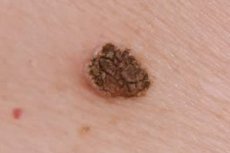New therapeutic target discovered for treatment of treatment-resistant melanoma
最近審查:14.06.2024

An international team of researchers led by scientists from the University of Liege (Belgium) has identified a promising therapeutic target for the treatment of melanoma resistant to targeted therapy. Inhibiting the VARS enzyme may prevent treatment resistance by resuscitating tumors previously resistant to targeted therapy.
Melanoma: challenges and current treatments
Melanoma is one of the most serious and aggressive forms of skin cancer. If detected early, melanoma is removed surgically. However, with the development of metastases (secondary tumors), treatment of melanoma becomes difficult, which reduces the chances of recovery. Every year in Belgium, about 3,000 people are diagnosed with melanoma. Doctors use targeted therapies to treat patients with a mutation in the BRAF gene, which produces the B-Raf protein that promotes cancer. This mutation occurs in more than 50% of patients, explains Pierre Clause, a researcher at ULiège. Although targeted therapies are effective in shrinking tumors, almost all patients develop acquired or secondary resistance to these therapies, limiting long-term therapeutic response. Therefore, it is important to understand the mechanisms of resistance to targeted therapy in order to develop new treatment strategies for patients with melanoma.
ARNt and VARS
A team from the Laboratory of Cancer Signaling Pathways at ULiège, led by Pierre Clause, has made an important discovery in this area. “Through analysis of the collected data, we discovered that the adaptation of melanoma cells to targeted therapy is associated with a reprogramming of protein synthesis,” explains Najla El Hachem, lead researcher at the Belgian Cancer Foundation in the Pierre Clause Laboratory. "We used a variety of protein and RNA sequencing techniques and found that therapy-resistant cells had developed a dependence on certain key elements of protein synthesis regulating transfer RNAs (tRNAs)." These elements include the enzyme VARS (valyl-tRNA synthetase), which regulates aminoacylation - the process of attaching an amino acid to tRNA - and contributes to the resistance of melanoma cells. Genetic inhibition of VARS prevents therapy resistance and resensitizes tumors resistant to targeted therapies.
New hope for patients
The results of this study pave the way for new treatment combinations for malignant melanoma. “This discovery shows that regulation of transfer RNAs plays an important role in therapeutic resistance,” enthuses Pierre Clause. "Inhibiting VARS may improve the effectiveness of targeted therapies and limit the development of treatment resistance. These results may lead to the development of new therapeutic strategies and offer a new ray of hope for patients suffering from resistant melanoma." Researchers will continue their work to turn this discovery into a concrete and effective therapeutic option.
The results of the study were published in the journal Nature Cell Biology.

